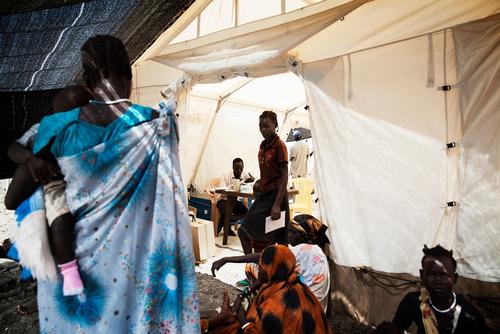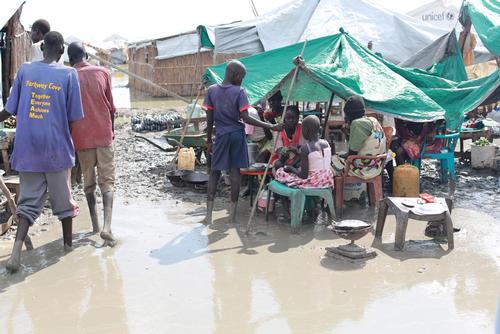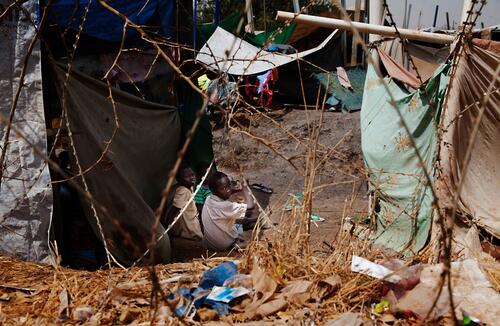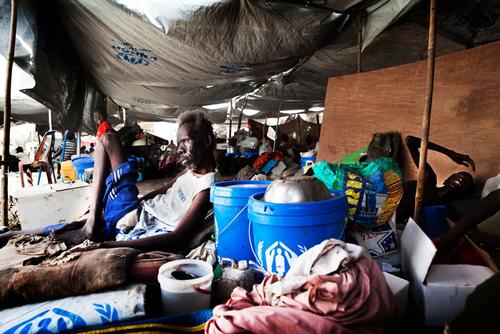This article first appeared in Huffpost.
- MSF Canada’s Executive Director Stephen Cornish recently returned from South Sudan, where he witnessed first-hand the humanitarian crisis currently affecting the world’s youngest country.
- Over the course of his visit — during which he visited several Protection of Civilian camps managed by the UN's mission in South Sudan (UNMISS), where thousands of people have taken refuge from the violence that has swept across the country since last December — he maintained a blog diary, which was originally published by the Huffington Post.
- This is one of his journal entries, chronicling his trips to the POC camps in Malakal, Melut and Bentiu, where Médecins Sans Frontières (MSF) is providing healthcare to those trapped inside with nowhere else to go.
Roughly 1,300 people are currently living on a United Nations-run base in Melut, South Sudan, a crowded patch of parched earth barely half the size of a football field, where they are being sheltered by the UN’s intervention force in South Sudan (UNMISS) and running low on hope.
Atypically, conditions on the base — which has been converted into a displacement camp for those fleeing the violence of South Sudan’s recent civil conflict — may be hardest on the men, many of whom came to the region years before in search of jobs. Melut is located in South Sudan’s oil belt, and in recent years people from across the country made the pilgrimage here in search of work. Those who found employment, whether working directly for the oil industry or for associated public or private services, often brought their families to join them in a better life. But ever since last year’s schism in South Sudan’s government, and the country’s subsequent descent into an ethnically divided civil war, the people here are personae non grata, unable to work or to circulate freely and forced to hide from neighbours who now seek to do them harm.
So with their families, Melut’s former workers now live in cramped dingy shelters which swelter in the noon sun and whose bare parched earth floors, instantly turns to sticky soapy clay as the night rains regularly flood the encampment. Unable to work or earn a living, dependent on humanitarian aid to feed and care for their families and on the UN’s barbed wires for protection, hemmed into what is a de facto humanitarian prison.
Despite the sweltering 40-degree heat, on the day I visit the camp almost everyone is out of doors, patiently waiting in line for a long-promised food distribution. It has now been almost six weeks since the last distribution, which is supposed to come every 15 days. A ration consists of 500 grams of sorghum, 50 grams of lentils, 30 grams of vegetable oil, and five grams of salt per person. Try as many people here must, stretching two weeks of food into six is no easy feat, and many parents cut back significantly to ensure their children have enough. For the few who have family overseas, sent funds have helped make ends meet, but for most this simply isn’t an option. So when the household rations grow thin, the women venture out of the confines of the camp to collect firewood, which they sell or trade for food in the nearby town. The twigs and branches they save to cook for their families meals, as there is no firewood or charcoal in the camp.
With so many families struggling to feed themselves, it is no surprise there is malnutrition in the camp. Médecins Sans Frontières (MSF) runs an assistance program where underweight children receive supplementary food, one of many similar interventions across South Sudan, which is in the grips of a growing nutrition emergency across the country. In absence of any change for the better in the dynamic of this conflict, anything that will remove the bitter violence that confines these families to this prison of protection, these children and their parents remain dependent on humanitarian aid for their survival. But if that aid fails to meet their basic human needs, the displaced residents of Melut may soon face a choice between facing the threat of violence outside their current refuge, or slow wasting away within.






